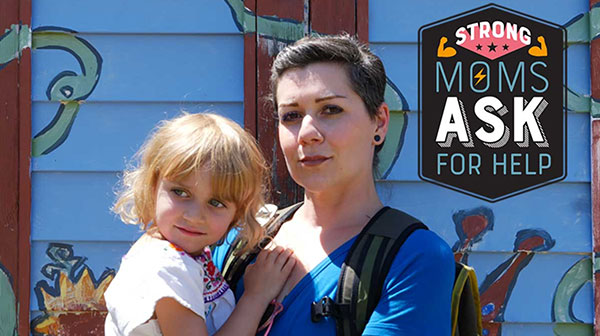In Volume 9 of the Strong Moms Ask for Help Newsletter, we offer suggestions for moms diagnosed with a mental disorder, we offer cool tips and resources for parenting through it all, and share ways to engage with Mountain Home. So check it out, then let us know what you love, what you don’t, and what you want us to add next time! Enjoy!
You are not your label
It happened. You found a professional, you answered a lot of very personal questions, and now you’ve gotten a diagnosis. It’s going to be okay. Really. Take a deep breath, and keep reading for five actions that can really help.
1. Take heart.
Whether it’s postpartum depression or bipolar disorder, your feelings might be a hot mess after being diagnosed with a mental illness: relief at having a name for what’s going on, and/or fear about what will happen next, and/or sheer rage that ON TOP OF RAISING A CHILD you also have to deal with THIS. But remember, you are not alone. Ten to twenty percent of mothers experience postpartum depression, for example, and one out of every five adults in the US has a mental health condition.
And as NAMI (National Alliance on Mental Illness) points out, getting a diagnosis is a huge tool for you and your doctor and therapists to chart out a plan for treatment. As well, a diagnosis lets insurance companies know that you have a condition that may require medical care, which may ease financial concerns. As NAMI says, “Even though labeling your symptoms doesn’t automatically relieve them, congratulate yourself on having moved forward in the process of getting treatment and protecting your rights.”
2. Learn more.
While your doctor or therapist talks about your diagnosis and treatment options, NERD OUT. Get a pen and paper and take notes. Make them slow down if they’re going too fast. Ask them for websites or articles to read, or support groups to join. If you can, have a partner or friend or family member with you (and another one babysitting the kid—you need to focus on you right now). Ask whoever is with you to NERD OUT also by taking lots of notes and asking lots of questions. Then you can compare what you heard later.
3. Collaborate.
The good news is that there are many different ways to reduce or even banish altogether symptoms of mental illness. The down side is that there’s not a silver-bullet solution that will work in every instance. Communicate clearly with your professional team on what seems to be working, what concerns you have, or bothersome side effects. Your team will have experts on what statistically works best in situations like yours, but remember that you are the expert on you. Working together in a respectful two-way dialogue…(read full newsletter here.)

